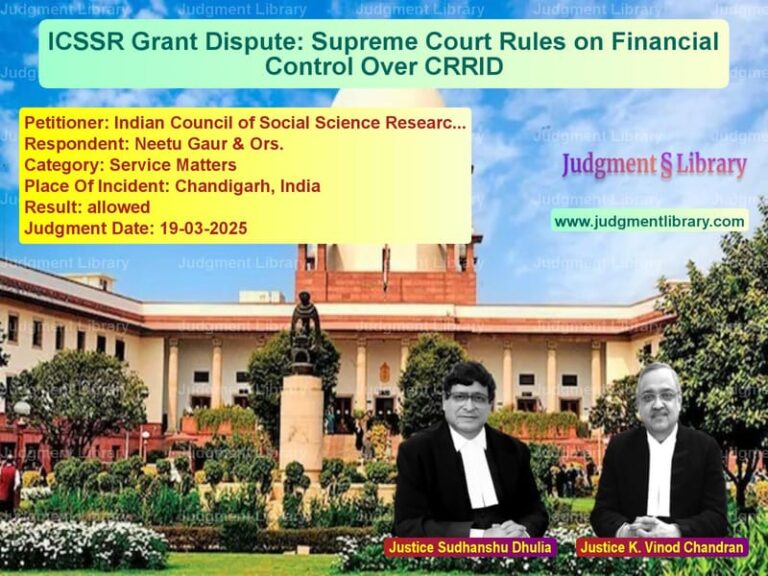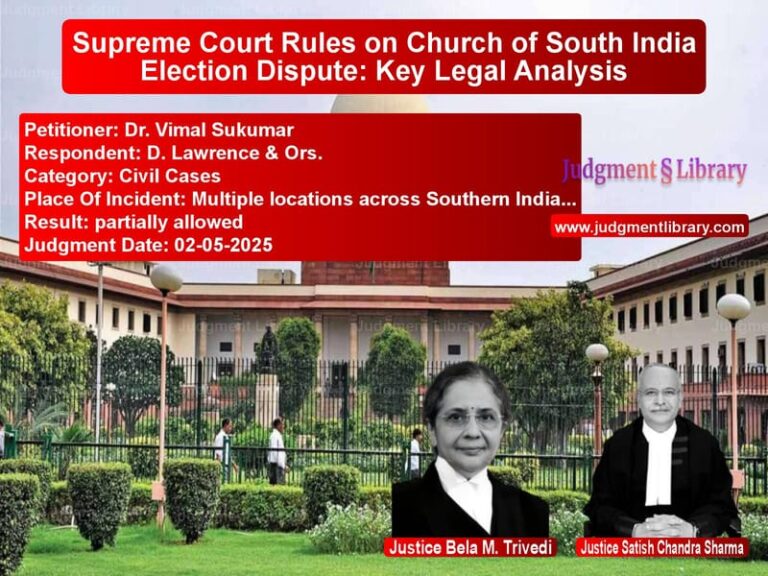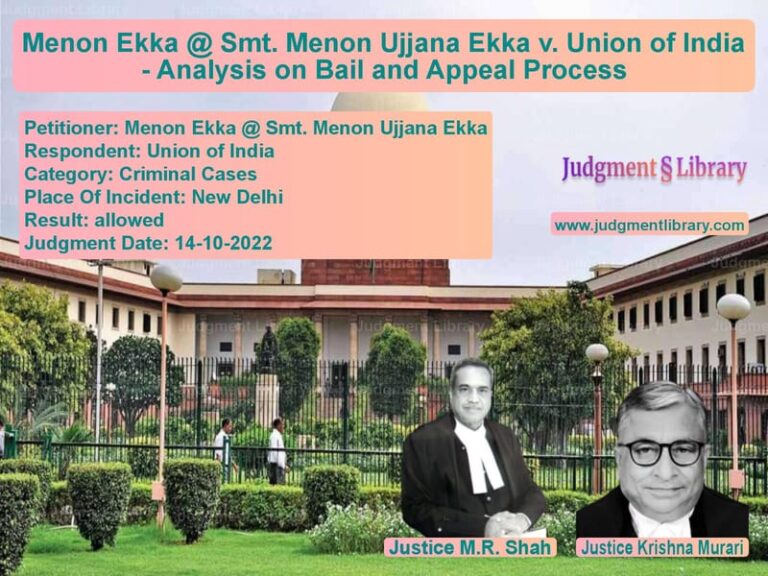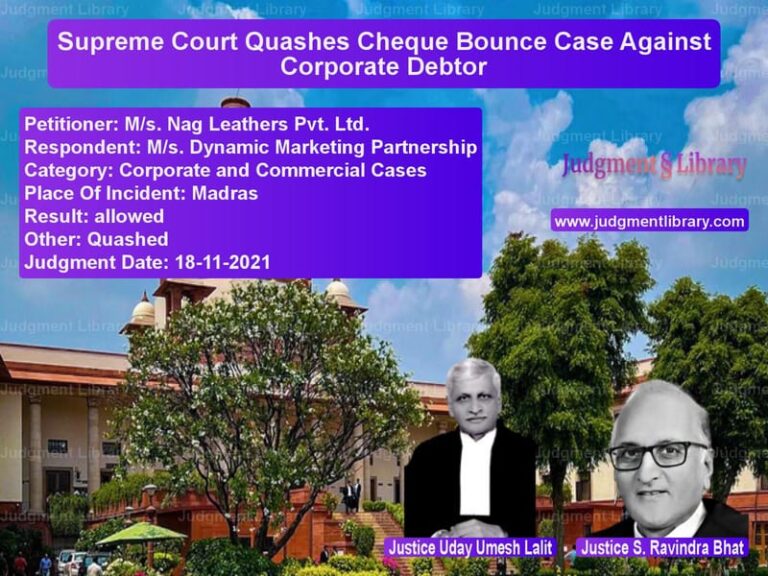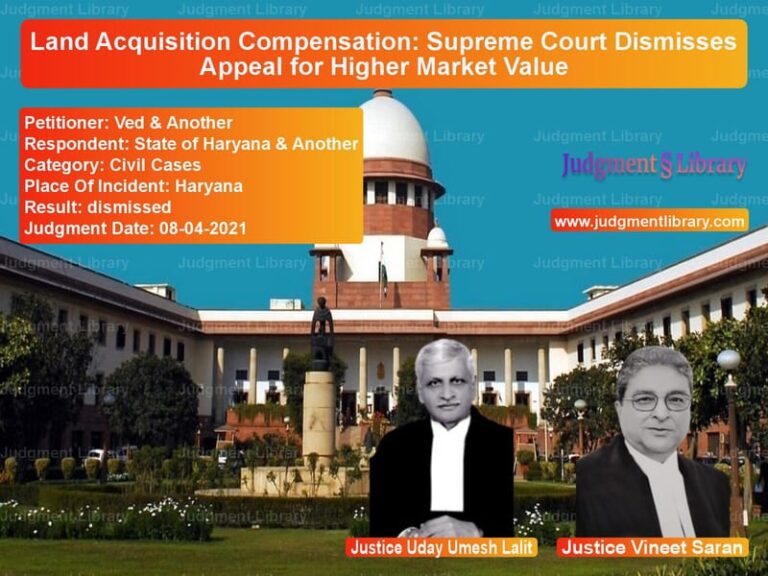Supreme Court Allows Plaintiff to Testify in Land Dispute Case Against Nagar Palika
The Supreme Court of India, in the case of Prasadi Devi vs. Nagar Palika Sawai Madhopur (Now Nagar Parishad), addressed a legal dispute regarding land possession and the plaintiff’s right to testify in court. The Court set aside the High Court’s order and directed that the plaintiff, an elderly woman, be allowed to present her testimony either in court or through a commission at her residence.
Background of the Case
The dispute originated when the plaintiff, Prasadi Devi, filed a civil suit seeking a permanent injunction against the Nagar Palika (Municipal Council) of Sawai Madhopur, Rajasthan. She claimed ownership and possession of a piece of land in Mantown, Alampur village, and sought to prevent the municipal authorities from interfering with her property or creating third-party rights over it.
The trial court dismissed her request to have her power of attorney holder testify on her behalf. Aggrieved, she moved the High Court under Article 227 of the Constitution, but the High Court also ruled against her. She then approached the Supreme Court, seeking the right to testify in person or through alternate means.
Key Legal Issues
The Supreme Court examined the following legal issues:
- Whether the High Court erred in dismissing the plaintiff’s plea to have her power of attorney holder testify on her behalf.
- Whether an elderly plaintiff could be granted the facility to testify at her residence through a court-appointed commissioner.
- Whether the trial court’s rejection of the power of attorney holder’s testimony was legally justified.
Petitioner’s Arguments
The appellant, Prasadi Devi, represented by her legal counsel, argued that:
- She was an illiterate woman in her eighties and had difficulty appearing in court due to old age.
- The trial court should have permitted her power of attorney holder, Gajanand Goyal, to testify on her behalf.
- The High Court failed to consider her physical limitations and her right to present evidence in support of her claim.
- She should be allowed to testify in person or, alternatively, be examined on commission at her residence.
Respondent’s Arguments
The Nagar Palika of Sawai Madhopur, represented by its legal counsel, countered that:
- The plaintiff should personally testify in court if she wished to present evidence.
- The trial court correctly ruled that the power of attorney holder could not substitute for the plaintiff’s testimony.
- The High Court’s order was legally sound and did not require interference.
Supreme Court’s Observations
The Supreme Court, led by Justices R.K. Agrawal and Abhay Manohar Sapre, reviewed the case and made the following key observations:
- The trial court was correct in holding that the power of attorney holder could not testify in place of the plaintiff.
- However, given the plaintiff’s age and health condition, she should be allowed to testify in court or at her residence if necessary.
- The High Court failed to take into account the plaintiff’s physical limitations when dismissing her plea.
- To ensure a fair trial, the plaintiff must be given an opportunity to present her testimony in a manner that accommodates her health condition.
The Court stated:
“In view of the statement made by the learned counsel for the appellant, it is not necessary to examine the legality and correctness of the impugned judgment on its merits. The appeal is accordingly disposed of.”
Final Judgment
The Supreme Court ruled as follows:
- The appeal filed by the plaintiff, Prasadi Devi, was allowed.
- The High Court’s order was set aside.
- The plaintiff was granted the right to testify in court or, if necessary, be examined on commission at her residence.
- The trial court was directed to appoint a lady lawyer as a local commissioner to record the plaintiff’s testimony at her residence if required.
- The plaintiff was also permitted to call additional witnesses to support her case.
- The case was to be expedited and resolved within six months.
- Both parties were directed to appear before the trial court on December 4, 2017.
Implications of the Judgment
The ruling has significant implications for procedural fairness and the rights of elderly litigants:
1. Protection of Elderly Litigants’ Rights
The judgment ensures that elderly individuals are not denied their right to testify due to physical limitations.
2. Judicial Flexibility in Evidence Collection
The ruling highlights the importance of judicial discretion in accommodating witnesses who face challenges in attending court proceedings.
3. Limits on Power of Attorney Holders’ Role in Testimony
The Court reaffirmed that a power of attorney holder cannot substitute for a plaintiff’s personal testimony in a civil suit.
4. Expedited Disposal of Long-Pending Cases
The Supreme Court’s directive for the case to be resolved within six months sets a precedent for timely justice in long-pending civil disputes.
Conclusion
The Supreme Court’s ruling in Prasadi Devi vs. Nagar Palika Sawai Madhopur upholds the principles of fair trial and procedural accommodation for elderly litigants. By allowing the plaintiff to testify at her residence if needed, the Court balanced legal principles with humanitarian considerations, ensuring that justice is accessible to all, irrespective of physical limitations.
Don’t miss out on the full details! Download the complete judgment in PDF format below and gain valuable insights instantly!
Download Judgment: Prasadi Devi vs Nagar Palika Sawai M Supreme Court of India Judgment Dated 13-11-2017.pdf
Direct Downlaod Judgment: Direct downlaod this Judgment
See all petitions in Property Disputes
See all petitions in Landlord-Tenant Disputes
See all petitions in Specific Performance
See all petitions in Judgment by R K Agrawal
See all petitions in Judgment by Abhay Manohar Sapre
See all petitions in allowed
See all petitions in Modified
See all petitions in supreme court of India judgments November 2017
See all petitions in 2017 judgments
See all posts in Civil Cases Category
See all allowed petitions in Civil Cases Category
See all Dismissed petitions in Civil Cases Category
See all partially allowed petitions in Civil Cases Category


